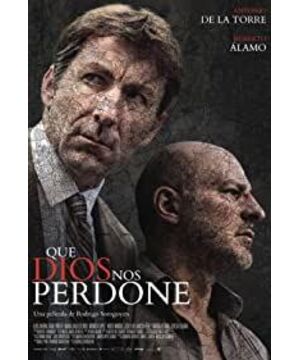"May God Forgive Us" tells the story of the stuttering policeman Willard and his irascible partner Alfaro who are asked to secretly investigate the serial cases of the rape and murder of an old woman. After Alfaro dies in the case, Willard captures the prisoner alone.
The film's story actually holds quite a bit of space, but the director's handling is huge. At the beginning of the film, in the crowded square, the camera is full of an old woman in red. The suspenseful atmosphere of this shot is very good, but the result is anticlimactic. In the subsequent photography, the entire film has a very small sense of space, which makes the audience very uncomfortable and self-defeating. As for the so-called thriller, only the basement scene and the only crime scene of the prisoner can be taken out. There was also a problem with the director's expression, that is, the title of the film sounds very profound, but the content of the story is just a perverted criminal. Since there is no emotional problem behind the criminal, but only as a background to shape the characters, then God is to forgive who? The irritable policeman Alfaro, the director gave too many scenes, and then let him die inexplicably. If you want to focus on his death, then don't make it so much that it seems to be burdened with a lot of emotional changes. First, watching the monitoring with the boss shows that he is irritable, then you can solve the predicament that this irritable character faces from the beginning? Moreover, such an irritable person went on a rampage and injured several passers-by, and was knocked to death by a monkey-like criminal in one fell swoop. Maybe it's true in reality, but what's more important in the movie is the image the director creates to the audience. Really can't figure out what Alfaro's death and his wife's cheating experience means to the whole story. The male protagonist Willard also has flaws. The director has made a lot of foreshadowing for him. When worshipping his mother, he pays attention to the old woman not far away. He investigates the case very seriously, and has similar experiences with criminals. But all this information was taken lightly, except for the explanation at the end that the stuttering was caused by the mother, which did not play any role. If the film does not cut into the criminal's perspective in the last part, but shapes the emotional factors behind the criminal from the very beginning, then such implicit innuendo is a very advanced aesthetic. But unfortunately the director didn't do that, so why not tell the story more clearly through the male protagonist? The contradiction and reconciliation between the two partners is also too understatement. The director may be deliberately trying to make the film achieve a certain texture. After all, even Villard learned that Alfaro's death scene was too simple to remember, and he didn't like this feeling very much. And the structure of the film's storytelling is too rigid. Difficulties, private life, and solving crimes, the director has been repeating this rhythm before the criminal appears, and after the criminal appears, he just inserts the criminal's perspective. And there is nothing that runs through the transformation of time and space. For example, the criminal report that appeared twice in the film, why not use this to design the editing?
View more about May God Save Us reviews











